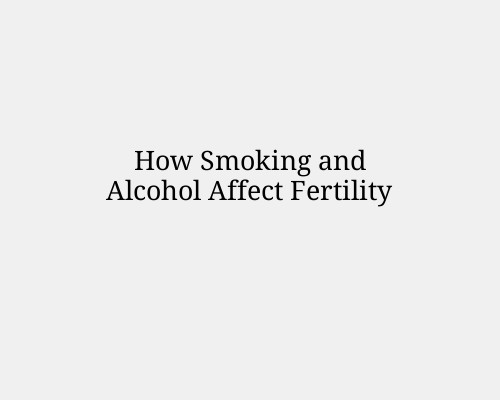
Fertility is a complex process influenced by numerous factors, including lifestyle choices such as smoking and alcohol consumption. Both habits can have significant negative effects on reproductive health in both men and women, reducing the chances of conception and increasing the risk of complications during pregnancy.
Effects of Smoking on Fertility
In Women
Smoking negatively impacts female fertility by interfering with hormone production, egg quality, and overall reproductive function. The harmful chemicals in cigarettes—such as nicotine, carbon monoxide, and tar—cause oxidative stress and reduce blood flow to reproductive organs.
Reduced Egg Quality
Smoking accelerates egg loss in the ovaries and damages the DNA within the eggs.
Women who smoke are more likely to experience early menopause due to faster depletion of eggs.
Hormonal Imbalance
Smoking affects oestrogen production, which is crucial for ovulation and implantation.
Irregular menstrual cycles and ovulatory disorders are more common in smokers.
Increased Risk of Infertility
Women who smoke are about twice as likely to struggle with infertility compared to non- smokers.
The chances of conception are significantly lower, even with fertility treatments such as IVF.
Higher Risk of Miscarriage and Ectopic Pregnancy
Smoking damages the fallopian tubes, increasing the risk of an ectopic pregnancy (where the fertilized egg implants outside the uterus).
The toxic chemicals in cigarettes increase the risk of early pregnancy loss.
Poor Uterine Environment
Smoking reduces blood flow to the uterus, making it harder for an embryo to implant.
Even if conception occurs, the likelihood of a successful pregnancy is lower.
In Men
Male fertility is also significantly affected by smoking, leading to reduced sperm quality and function.
Lower Sperm Count and Quality
Studies show that smokers produce fewer sperm than non-smokers.
Sperm are more likely to have abnormalities in shape and motility (movement), making fertilization difficult.
DNA Damage in Sperm
Smoking causes genetic mutations in sperm, which can lead to birth defects and developmental issues in offspring.
Damaged sperm increase the risk of miscarriage.
Reduced Testosterone Levels
Nicotine and other chemicals in cigarettes can lower testosterone, leading to reduced libido and erectile dysfunction.
Erectile Dysfunction
Smoking damages blood vessels, restricting blood flow and increasing the risk of erectile dysfunction, making conception more challenging.
Effects of Alcohol on Fertility
In Women
Alcohol consumption can disrupt reproductive health in several ways, especially when consumed in large quantities.
Hormonal Disruptions
Alcohol interferes with oestrogen and progesterone levels, affecting ovulation and menstrual regularity.
Heavy drinking can lead to anovulation (lack of ovulation), reducing the chances of conception.
Increased Risk of Miscarriage
Women who consume alcohol during early pregnancy are at a higher risk of miscarriage.
Alcohol can also contribute to fetal alcohol syndrome (FAS), which leads to developmental issues in the baby.
Reduced IVF Success Rates
Studies indicate that alcohol consumption lowers the success rates of assisted reproductive technologies like IVF.
It affects egg quality and reduces the likelihood of successful implantation.
In Men
Men who consume excessive alcohol also experience fertility problems due to its impact on hormone levels and sperm production.
Lower Sperm Quality
Alcohol reduces sperm count, motility, and morphology (shape), making it harder for sperm to reach and fertilize the egg.
Hormonal Imbalances
Chronic alcohol use lowers testosterone levels, leading to reduced libido and sexual dysfunction.
Increased oestrogen levels (caused by liver damage from alcohol) can impair sperm production.
Testicular Damage
Long-term alcohol abuse can shrink the testes, leading to reduced sperm production and infertility.
Erectile Dysfunction
Alcohol is a depressant that affects nerve function and blood circulation, leading to difficulty maintaining an erection.
Can These Effects Be Reversed?
The good news is that the negative effects of smoking and alcohol on fertility can often be reversed, especially if lifestyle changes are made early.
Quitting Smoking
Women who quit smoking can see improvements in their reproductive health within months.
Men who stop smoking can experience an increase in sperm count and quality after about three months.
Reducing or Eliminating Alcohol
Limiting alcohol intake can restore hormonal balance and improve fertility in both men and women.
Sperm quality improves within three months after stopping alcohol consumption.
Adopting a Healthy Lifestyle
A diet rich in antioxidants, regular exercise, and stress management can help repair reproductive damage.
Taking prenatal vitamins and maintaining a healthy weight can also improve fertility outcomes.
Conclusion
Both smoking and excessive alcohol consumption significantly impair fertility in men and women, affecting egg and sperm quality, hormonal balance, and reproductive function. While these effects can be severe, they are often reversible with lifestyle changes. If conception is a priority, quitting smoking and reducing alcohol intake can greatly improve the chances of a healthy pregnancy.